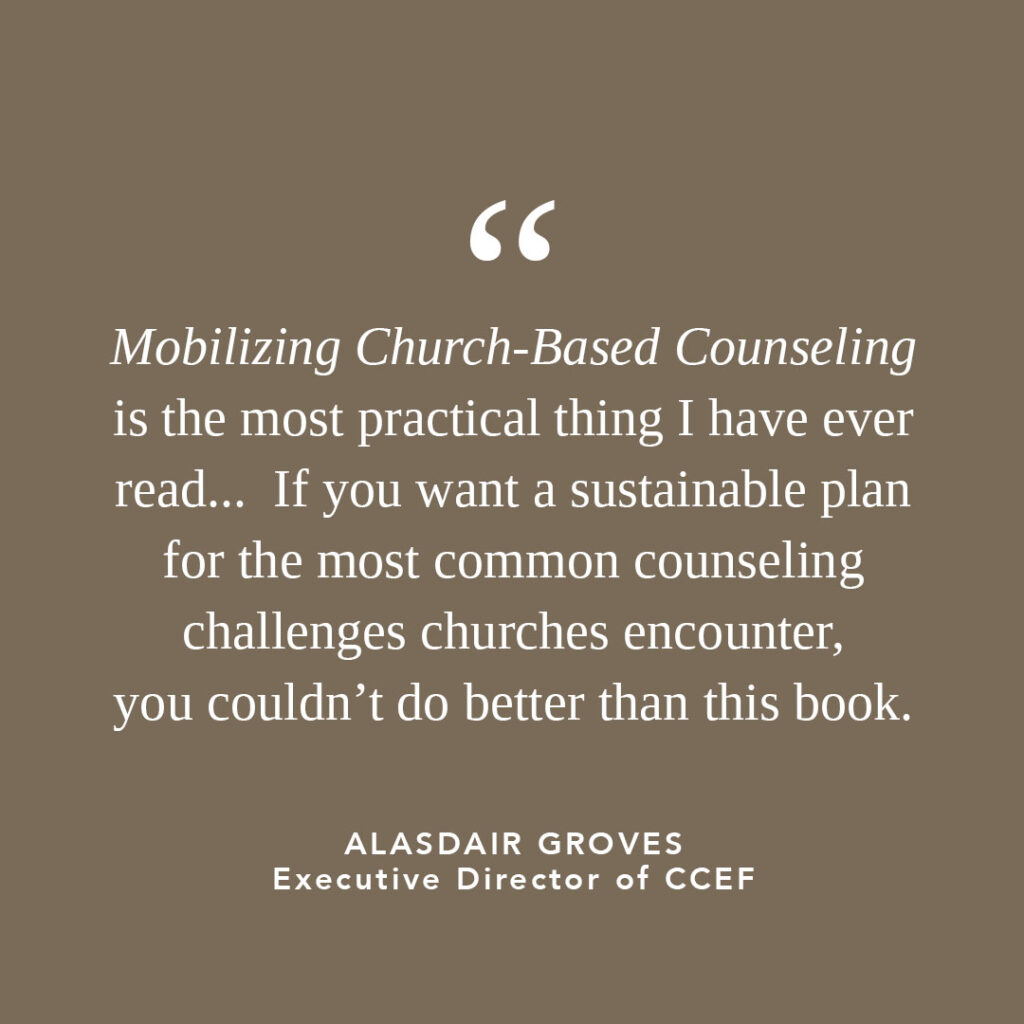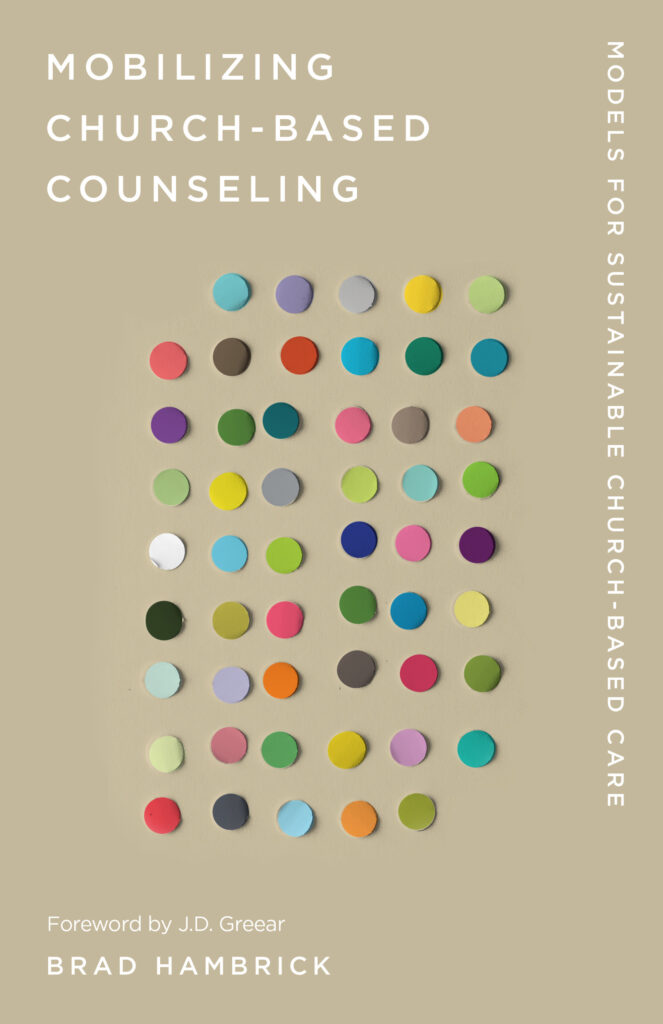The following post is an excerpt from Mobilizing Church-Based Counseling, the first book in the Church-Based Counseling series which provides a framework for guiding churches through the process of building a volunteer-led counseling ministry.
Many churches would like to start a counseling ministry, but they don’t know where to start. Mobilizing Church-Based Counseling offers direction to churches for creating a ministry built around lay-led counseling groups and mentoring. Based on proven models used in his own congregation, Brad Hambrick lays out a clear plan to launch a sustainable soul-care ministry that can be replicated in churches of any size.
The fact that you’re reading this book means you want to do a very good thing! You want to help hurting people. You want to mobilize your church to be a source of care for its members and community. You want to point people to the hope of Christ amid their hardships.
You want to invite people into a community of care where everyone acknowledges their brokenness (Psalm 34:18) and seeks redemption together (Galatians 3:13). You want to break the stigma of counseling and cultivate a community where it’s okay to be a work in process (Hebrews 4:15–16).
You want to make the church a more authentic place. You want to deepen surface-level prayer requests and head-knowledge Bible studies. You want to find out what would happen if we all quit “playing church” and opened ourselves up to the possibility of God changing our personal, emotional, and relational lives. You want your church to be a conduit through which people experience all that God wants to be and do in their lives (Acts 3:20).
These are all good things, and my prayer is that this book will help you bring them about through the ministry models we’ll discuss.
Because these are all such good things, we are left asking questions. Why aren’t there more church-based counseling models? Why aren’t there a litany of ministries churches can adapt and implement to fulfill these good objectives? Why do church leaders often get nervous about starting a counseling ministry when we just want to help people?
These are important questions, and there are important questions behind these questions. This book is about helping you understand all of them so that you can do the good thing you want to do with excellence.
That word excellence may move you from excitement to angst as you wonder, What if I’ve never done anything like start a counseling ministry before? That’s a healthy concern—it reveals humility—and we’ll take this concern seriously. This book assumes that you are a lay volunteer without advanced training in counseling. In the pages ahead, you’ll learn how to secure experienced supervision, to honor the information disclosed in this new ministry, and to build a team so that you don’t have to carry these responsibilities alone. Ironically, starting this ministry requires the same courage to face uncertainty that participants in your counseling ministry will show when they first reach out for help. Pay attention to the unsettledness you feel; navigating this experience will help you care for others.
With these things in mind, know the underlying premise of this book is this: the more important something is, the more important it is to do it well and the more dangerous it is to do it sloppily. Because a counseling ministry will invite people to be vulnerable with the most sensitive parts of their lives, it will—for better or worse—have immense influence. With great influence comes great responsibility. But doing a lay counseling ministry well doesn’t necessarily mean mimicking professional models (i.e., intake forms, case notes, meeting by appointment, creating an individualized treatment plan, etc.). In a local church, it means creating a ministry that fits within a church context and which can be implemented by lay volunteers.
In light of this understanding of “good,” Mobilizing focuses on helping you launch two specific lay counseling ministries: a group-based model called G4 and a mentoring model called GCM. We’ll define G4 and GCM in chapters 3 through 6, but for now, you need to understand these counseling ministries were designed to have three key features. These features are:
- Compatibility with the local church: G4 and GCM are designed to be led effectively by laypeople in your church and to fit within the rhythms of a leader’s schedule and a church’s structures.
- Wisdom about issues of liability: G4 and GCM are designed with the informed consent and the ethical consideration needed for a moderately formal, lay-based ministry.
- Sustainability for your volunteers: G4 and GCM are designed with a recognition that the longevity of your mentors and group leaders is essential to an effective lay-based ministry.
In the pages ahead, the significance of these three features will become increasingly clear to you. You will see how these features are woven into almost every facet of G4 and GCM. Being able to highlight these features will bring comfort to your church leadership, potential volunteers, and growing list of community partners. These features reveal that you have more than good intentions; you have a solid plan that allows you to care well for people in difficult situations.
You will also realize that “creating a counseling ministry” is different from “training counselors.” Training helpers is only one part of the process and is not the first thing to be done. That’s why we will take the following three-tiered approach:
- Section one clarifies common points of confusion about church-based counseling.
- Section two provides guidance on the neglected subject of counseling ethics in lay-based care models.
- Section three lays out a launch plan for G4 and GCM.
Until these things are well understood, it would be unwise to move toward vetting and training potential lay leaders for these ministries. To be ready to care for these leaders, you and your church leadership need to be clear about what you’re inviting them to participate in.
If you are ready to take this journey in a way that values quality more than expediency (that is, doing things well more than doing things quickly), this book will be satisfying for you.
Excerpted from Mobilizing Church-Based Counseling © 2023 by Brad Hambrick. Used with permission of New Growth Press. May not be reproduced without prior written permission.
Mobilizing Church-Based Counseling
Many churches would like to start a counseling ministry, but they don’t know where to start. Mobilizing Church-Based Counseling offers direction to churches for creating a ministry built around lay-led counseling groups and mentoring. Based on proven models used in his own congregation, Brad Hambrick lays out a clear plan to launch a sustainable soul-care ministry that can be replicated in churches of any size.







